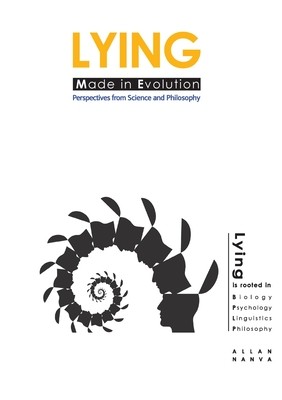
- We will send in 10–14 business days.
- Author: Allan Nanva
- Publisher: Publicious Pty Ltd
- ISBN-10: 0648766608
- ISBN-13: 9780648766605
- Format: 14.8 x 21 x 1 cm, minkšti viršeliai
- Language: English
- SAVE -10% with code: EXTRA
Reviews
Description
Science and philosophy join forces in this book to explain the phenomenon of deceptive behaviour. Darwin is here to tell us that deception is rooted in evolution; Freud talks about the psychology of lying; Jean Piaget and Noam Chomsky comment on language development and the onset of lying; Plato, Aristotle, Saint Augustine, Thomas Aquinas, Immanuel Kant, Thomas Hobbes, David Hume, Jean-Jacques Rousseau, A. J. Ayer and many others express their views on moral and ethical aspects of lying. It is refreshing to read about Utilitarian lying, Consequentialism, Hedonism and Visceral morality concisely and in such clear language. Pinocchio's nose is given scientific characteristics, its functions analogized to the polygraph and the fMRI machine. The author presents wide ranging information scarcely found in one volume. This introductory book is destined to find its deserving place on many a curious shelf.
EXTRA 10 % discount with code: EXTRA
The promotion ends in 21d.08:49:52
The discount code is valid when purchasing from 10 €. Discounts do not stack.
- Author: Allan Nanva
- Publisher: Publicious Pty Ltd
- ISBN-10: 0648766608
- ISBN-13: 9780648766605
- Format: 14.8 x 21 x 1 cm, minkšti viršeliai
- Language: English English
Science and philosophy join forces in this book to explain the phenomenon of deceptive behaviour. Darwin is here to tell us that deception is rooted in evolution; Freud talks about the psychology of lying; Jean Piaget and Noam Chomsky comment on language development and the onset of lying; Plato, Aristotle, Saint Augustine, Thomas Aquinas, Immanuel Kant, Thomas Hobbes, David Hume, Jean-Jacques Rousseau, A. J. Ayer and many others express their views on moral and ethical aspects of lying. It is refreshing to read about Utilitarian lying, Consequentialism, Hedonism and Visceral morality concisely and in such clear language. Pinocchio's nose is given scientific characteristics, its functions analogized to the polygraph and the fMRI machine. The author presents wide ranging information scarcely found in one volume. This introductory book is destined to find its deserving place on many a curious shelf.


Reviews